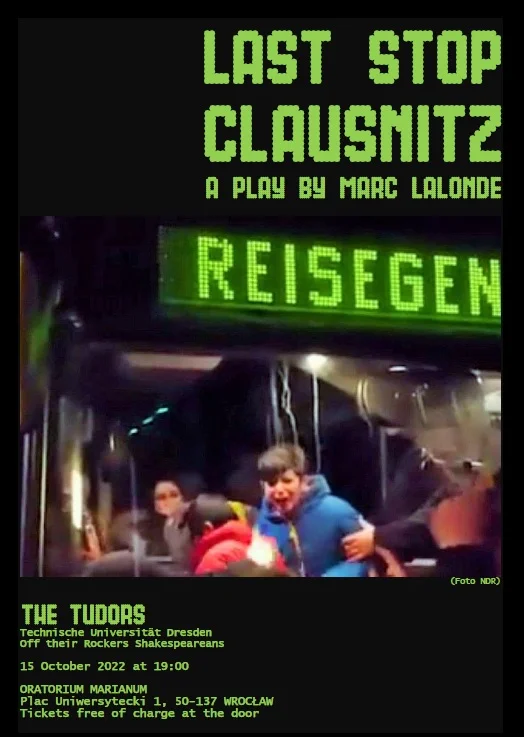
Invitation to a play in English
The Institute of English Studies and the Institute of Romance Studies of the UWr would like to invite you to a theatre performance in English entitled Last Stop in Clausnitz performed by the theatre group TUDORS(Technische Universität Dresden Off their Rockers Shakespeareans) from the Technical University ofDresden. The performance will be staged at the Oratorium Marianum onSaturday 15 October 2022 at 19.00, is free of charge and is an excellent opportunity to learn English informally.
The play’s author and director, Marc Lalonde, is a lecturer in English and French, a native of Quebec and has lived in Dresden for 20 years. Last Stop in Clausnitz is his third play. It is based on personal experiences of the relationship between German society and immigrants and refugees. Two of the play’s actors are refugees from Syria.
The play premiered in Dresden on 24 September to an enthusiastic reception (excerpted from a review that appeared in the Sächsische Zeitung newspaper , translated by M. Lalonde below).
The organisation of the event was supported by the Dean of the Faculty of Letters at the UWr, prof. dr. hab. Arkadiusz Lewicki.
For further information, please contact:
dr Monika Grabowska: monika.grabowska@uwr.edu.pl dr Katarzyna Sówka-Pietraszewska: katarzyna.sowka_pietraszewska@uwr.edu.pl
Refugee stories
In the play “Last Stop: Clausnitz”, the four refugee stories that are told symbolise the fate of many who were forced to flee; all of whom having one thing in common: the hope of a better life.
By Lea Heilmann, Sächsische Zeitung, Dresden (27 September 2022)
The village of Clausnitz in the Ore Mountains, south of Dresden, became sadly famous six years ago when a bus of refugees was blocked by some of its citizens, who were shouting “We are the people”. Marc Lalonde spent two years in Clausnitz helping the refugees. He wrote the play “Last Stop: Clausnitz” based on their stories about leaving home, fleeing to and arriving in Germany.
The premiere was held in the Dresden University of Technology’s student movie theatre. A table and a few chairs were all The TUDORS, the English department’s theatre group, needed to tell the stories of four refugee couples. They all had different reasons to flee their homelands: war, religion, love. However, their goal was the same: Germany. The audience follows the couples one after the other until they all meet on the bus to Clausnitz. The play, performed in English, focuses mainly on the flight whereas the events in the village itself are just briefly mentioned. Although all this happened six years ago, the play is more than relevant today since many are again fleeing via the Mediterranean Sea to Europe and to Germany.
Despite dealing with a very serious topic, the play still offers several funny moments. When the refugees are confronted with the German culture, they ask themselves why the Germans eat so much pork, if they have ever heard of lamb, or if they still use toilet paper. The highlight of the play was the solo performance of Nasser Wannous, one of the two Syrian refugees to act in the cast. He clearly and critically deals with the role of rich countries in wars, he wonders about the incomprehensible distinction between safe and unsafe countries of origins, and tells the story of one who had to flee. At one point, reality and fiction seem to blend into each other, and we are not sure if he is still acting or actually telling us his own story.
There were five refugees in the audience who themselves were on the Clausnitz bus and whose stories inspired Lalonde to write his third play. At the end of the performance, all five stood on stage, happy and proud. Their stories represent those of so many others.
On the 13th of October, the theatre group will be performing again at the Chinese Pavilion in Dresden. Afterwards, The TUDORS will go international by putting on their play in Poland and in England.




